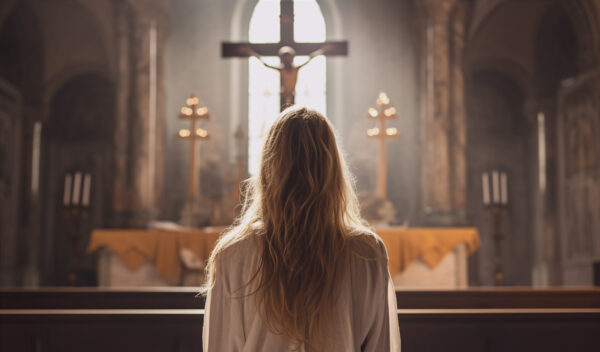This year, the Church lived the Easter season on the road to Emmaus. This reality began to dawn on me as my fiancé and I sat together in dejected silence, watching from the comfort of his living room couch as our bishop presided over the Easter Vigil Mass. As we fired up the livestream, I couldn’t stop tears from flowing — not the usual, joyful tears that come when we celebrate the Resurrection, but sad, even angry, tears. As the Exultet began, the only prayer I could muster was, “Lord, it’s not supposed to be this way.”
I have never identified with the disciples on the road to Emmaus. Their brooding disappointment against the dazzling backdrop of the Resurrection always seemed so silly to me. If only they’d open their eyes, they would see that Jesus is risen, death has been conquered and all is well. Instead, they assume the women who told them Jesus is alive again must have gone crazy. They don’t even wait around for proof. Sad, broken-hearted, probably a little bit angry, they just take off, leaving Jerusalem in the dust as they head for Emmaus.
This year, barred from the sacraments due to COVID-19, I finally understood — at least a little bit — how those disciples felt on that first Easter day. Whether we liked it or not, I think all of us found ourselves on the road to Emmaus as the celebration of Easter continued without public Masses. The empty tomb, which we’ve always been able to access through the celebration of the Mass, was now off-limits. We found ourselves scattered, confused, unable to get physically near the risen Lord. And I don’t know about you, but I felt angry, too. I’ve spent most of my life following the Church’s precepts about Mass attendance, building a Eucharistic habit of prayer, and seeking to make the sacraments central to my weekly and even daily life. Now I felt like God was throwing all of that back in my face.
And just like the disciples on the way to Emmaus, this is where the great plot twist happened. “Jesus himself drew near and walked with them” (Lk 24:15).
As the Easter weeks went by, one after the other, with public Masses still suspended, Jesus came to meet us. I say this with confidence, that he came to meet us, because even though I can only speak for myself, I know for a fact that this is how he cares for each one of us. This Easter season spent in quarantine was a time of surprising joy, as I kept stumbling across ways in which Jesus drew near and walked with me. He was there the day I got married (on Divine Mercy Sunday, with the requisite 10-person limit in attendance). And he has been there at my side throughout all the days shut in at home, in my work-from-home office, in time spent each day with my new husband, in the household chores, the masked outings, the moments of confusion and doubt, and the bursts of joy and laughter.
Jesus was always there before, I know, but because I could relegate my life of prayer to punctuated moments in the chapel or at Mass, I didn’t watch for him the way I do now. When everything was “normal,” I assumed that Jesus only comes in search of us when we stray. Surely the Good Shepherd only needs to look for his sheep when they’re lost! When all is as it should be, we just stay in the pasture and listen for our shepherd’s voice. (For us Catholics, that means we go to Mass every week, make confession a regular priority and build some kind of habit of prayer.) But here’s the thing I learned this Easter season: Any encounter with Jesus starts with his initiative. When we have regular access to the sacraments, it’s easy to feel like we’re doing all the work. We have to make the plan to attend Mass or go to confession; we have to drive (or walk or bike) to the church. We have to do something in order to get there. Yet the reality is that God is always coming in search of us. Even when we pray, that action is only a response to his loving initiative.
This year, God took away the crutch of my spiritual activity so that he could show me what his love is really like. He wants to walk with me and to remain with me in every moment and action of my life. This Christian life I lead is his idea. He wanted to be my friend first, long before it ever occurred to me to try to be his.
Yes, I’m thrilled to return to Mass, even amid new social distancing requirements. But as we celebrate Pentecost and move back into Ordinary Time this summer, I want to keep this discovery of the Lord’s presence alive. Our “new normal” should not just be physical, as we accustom ourselves to masking and social distancing to stop the spread of this virus. Our new normal should be first and foremost spiritual. We have a God who loves us first, who wants to be present in our daily and sometimes humdrum lives, who is deeply interested in our wants, needs and even disappointments. We never have to worry that he has forgotten or abandoned us. That isn’t possible. Jesus always comes in search of us.




